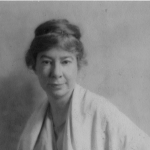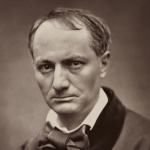I
Oh chimes set high on the sunny tower
Ring on, ring on unendingly,
Make all the hours a single hour,
For when the dusk begins to flower,
The man I love will come to me! ...
But no, go slowly as you will,
I should not bid you hasten so,
For while I wait for love to come,
Some other girl is standing dumb,
Fearing her love will go.
II
Oh white steam over the roofs, blow high!
Oh chimes in the tower ring clear and free!
For the man I love, loves me! ...
Oh drifting steam disperse and die,
Oh tower stand shrouded toward the south,—
And laid her finger on my mouth.
III
The dusk was blue with blowing mist,
The lights were spangles in a veil,
And from the clamor far below
Floated faint music like a wail.
It voiced what I shall never speak,
My heart was breaking all night long,
But when the dawn was hard and gray,
My tears distilled into a song.
IV
I said, “I have shut my heart
As one shuts an open door,
That Love may starve therein
And trouble me no more.”
But over the roofs there came
The wet new wind of May,
And a tune blew up from the curb
Where the street-pianos play.
My room was white with the sun
And Love cried out to me,
“I am strong, I will break your heart
Unless you set me free.”




















Comment form: